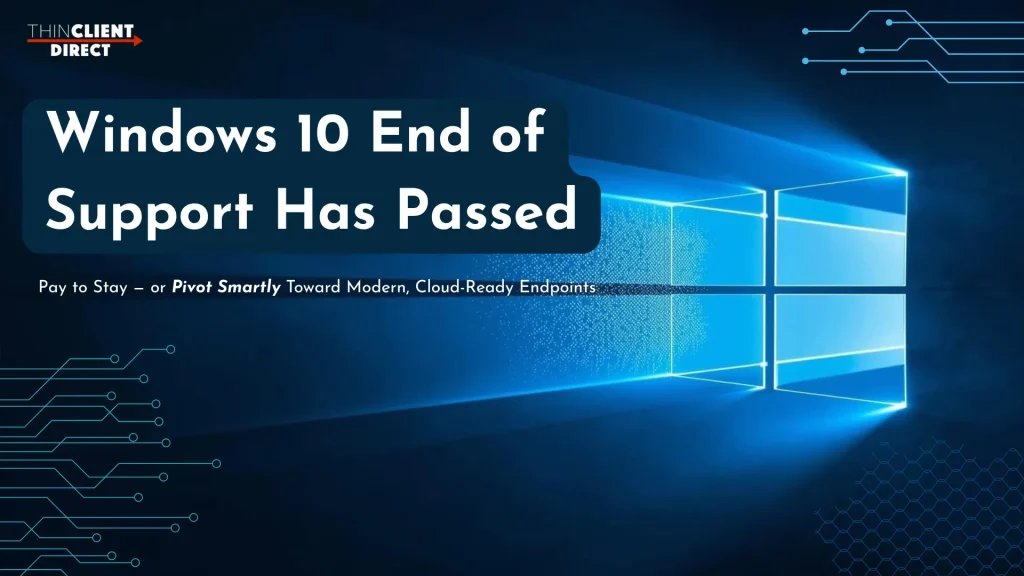Igel Buys Stratodesk: What's Behind This Surprise Move?
By Omar Kechrid, Founder & CEO of ThinClient Direct – June 3, 2025
The thin client and cloud workspace market has just seen a significant shakeup: Igel’s acquisition of Stratodesk. While the official details of the deal remain sparse, there’s plenty of room for educated speculation about why this deal happened — and what it means for the future of endpoint computing. As ThinClient Direct’s CEO, here’s my take on the drivers behind the acquisition and its broader impact on the industry.

Stratodesk's Growing Market Influence
Igel has been a dominant force in the thin client and endpoint OS market for over two decades. Known for its robust Linux-based OS, Igel has established a reputation for secure, easy-to-manage devices tailored for virtual desktop infrastructure (VDI) and Desktop as a Service (DaaS) environments.
But Stratodesk was steadily making waves. With its flagship product, NoTouch OS, Stratodesk brought a competitive alternative to Igel’s established offering. What started as a niche player in smaller deployments evolved into a real threat in larger enterprise deals. Stratodesk’s feature set wasn’t just catching up — in some cases, it was leapfrogging ahead, offering broader device support and impressive management features.
Price was another factor. Stratodesk’s aggressive pricing model put pressure on Igel, making Stratodesk an attractive option for cost-sensitive customers who didn’t want to sacrifice performance or security.
Even more significant was Stratodesk’s growing network of partners. They weren’t just selling into new accounts but forging relationships with integrators and resellers that traditionally leaned heavily on Igel. This growing presence was setting up Stratodesk as a serious alternative in the market.
By acquiring Stratodesk, Igel has effectively neutralized a rising competitor and secured a bigger slice of the endpoint OS market.
The Citrix and Unicon Factor
Beyond the competitive dynamic between Igel and Stratodesk, the broader market is also shifting. Citrix, a giant in the VDI and DaaS space, recently acquired Unicon. This move is a game changer for endpoint OS players.
Citrix customers are already paying a premium for top-notch technology, and with Unicon now in their portfolio, Citrix can offer a fully integrated endpoint OS solution that’s tightly coupled with their virtual workspace ecosystem. For many Citrix clients, this bundled approach may be more appealing than managing separate third-party endpoint solutions. To explore how Unicon’s eLux OS maximizes Citrix deployments, check out our in-depth breakdown: Unlock the Full Value of Citrix with Unicon’s eLux OS.
Igel’s need to differentiate itself becomes even more urgent in this environment. By bringing Stratodesk’s technology and expertise under its wing, Igel gains a broader feature set and an opportunity to position itself against Citrix’s new bundled offering. It’s a strategic play to ensure that Igel remains a top choice for enterprises that don’t want to be locked into Citrix’s stack or those who want a more flexible, vendor-agnostic endpoint solution.
Expanding into New Verticals with Raspberry Pi Support
While most of this acquisition concerns consolidating the enterprise endpoint OS market, Stratodesk’s OS support for Raspberry Pi devices is also an interesting secondary factor.
Raspberry Pi-based endpoints have long been an interesting alternative for certain edge and vertical markets. They’re cost-effective, energy-efficient, and easy to deploy at scale. Stratodesk’s NoTouch OS for Raspberry Pi opened up possibilities in digital signage, IoT gateways, and lightweight endpoints for education and retail. For a deeper dive into performance and use cases, check out our NVIDIA Jetson Nano Super vs Raspberry Pi comparison.
With VDI adoption facing challenges in some segments—including tighter IT budgets and changing workplace models—alternative form factors and specialized deployments could be a significant growth area for Igel. By acquiring Stratodesk, Igel has a direct path to expanding its presence in these emerging verticals and experimenting with form factors beyond traditional thin clients.
Leadership Transition: Emanuel Pirker's Exit
This deal also likely reflects a personal dimension. Stratodesk’s CEO, Emanuel Pirker, has been at the helm for 15 years, guiding the company from a small Austrian startup to a global player in the endpoint OS space. For any founder, 15 years is a long run — and it’s natural to think about what comes next.
The opportunity to join forces with Igel likely presented Pirker and his team with the perfect exit. It’s a chance to capitalize on Stratodesk’s success and ensure its technology thrives in a larger ecosystem.
Of course, any leadership transition raises a question: What does this mean for Stratodesk’s culture and innovation? Will the company’s innovative spirit continue within the Igel umbrella, or will it be subsumed by a more traditional, larger company approach? Time will tell.
More than Just Removing a Competitor?
As industry watchers, we hope this acquisition isn’t just about removing a competitive thorn. By bringing Stratodesk in-house, Igel has removed a direct competitor that was inching closer and closer to its core business. And yes, this move gives Igel more control over pricing, features, and how these two operating systems evolve.
But ideally, this deal will also foster greater innovation. Stratodesk and Igel have a long history of creating secure, easy-to-manage operating systems that help IT teams navigate the complexities of VDI, DaaS, and modern endpoint security.
Together, they can build something even stronger—an endpoint OS platform that meets the evolving needs of today’s hybrid workforces, remote users, and cloud-first organizations. If done right, this could be a turning point for the endpoint OS space, bringing us closer to the seamless, secure, and flexible endpoints many businesses crave.
Final Thoughts
By making this purchase, Igel can temporarily worry less about non-Citrix competition. There are still other players—from smaller Linux-based OS providers to niche hardware manufacturers—but this move solidifies Igel’s position as the go-to endpoint OS provider outside Citrix’s ecosystem.
The endpoint market isn’t static, however. With the Citrix-Unicon acquisition shaking things up and new security threats and work models constantly evolving, Igel will need to continue to invest and innovate if it wants to maintain this lead.
For now, though, this bold acquisition gives Igel more tools to compete, more control over its destiny, and the chance to shape the next chapter of the endpoint OS market. As always, we’ll be watching closely to see how this unfolds — and how it shapes the future of secure, cloud-ready endpoints in the enterprise.
Let's Talk Strategy—Before the Next Market Shift
The Igel–Stratodesk acquisition marks a significant shakeup in the endpoint OS landscape. What does it mean for your VDI plans, endpoint security, or your Citrix and Igel investments? And is now the time to consider new alternatives?
Let’s break it down—fast, clearly, and with your goals in mind.
Book a no-pressure call with ThinClient Direct to explore flexible, future-ready endpoint strategies designed around your environment.



